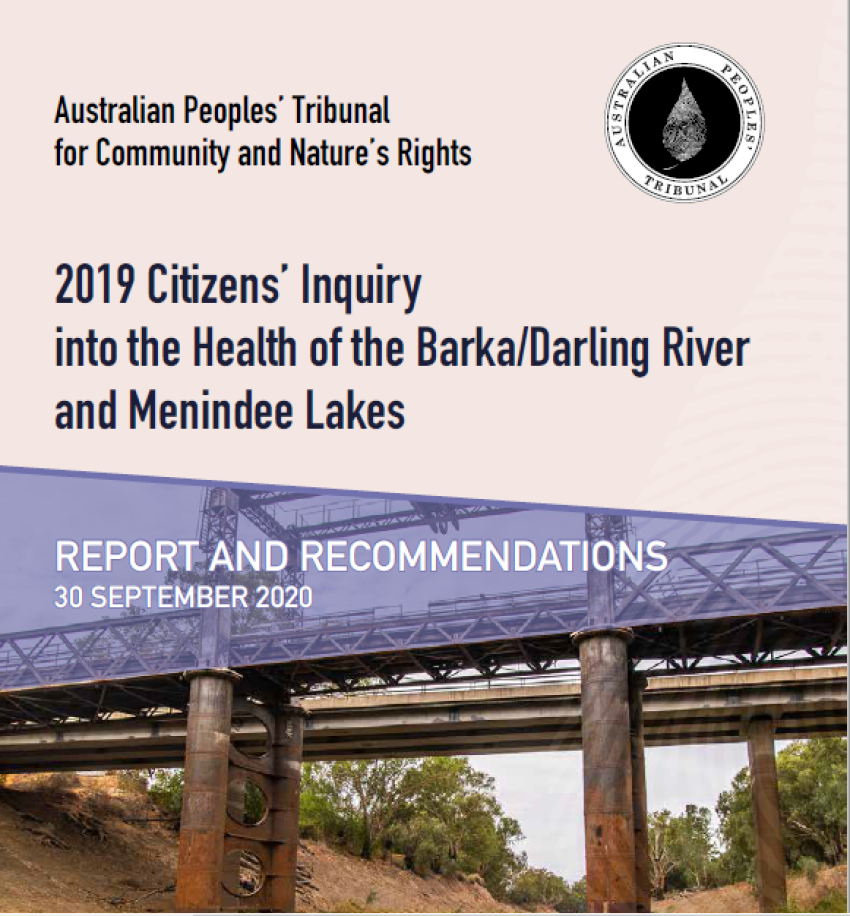
The Australian Peoples’ Tribunal (APT) report into the Barka/Darling River system disaster and the Menindee Lakes was made public on October 15.
APT, an initiative of the Australian Earth Laws Alliance, began the citizen’s inquiry in 2018 and over the following year contributors travelled the length of the Murray-Darling Basin to take 100 testimonials from those living on the river: farmers, Baarkandji First Nations elders and youth, small-scale irrigators as well as health workers and local councillors.
Contributors to the Citizen’s Inquiry into the Health of the Barka/Darling River and Menindee Lakes included Michelle Maloney, Gill Boehringer, Gwynn MacCarrick, Manav Satiga, Mary Graham and Ross Williams.
Quentin Grafton, from the Water Justice Hub at the Australian National University, introduced the report saying that European agriculture, which prioritised monoculture, nitrates, fertilisers and pesticides, had devastated the Murray-Darling River system.
These disaster policies continue, he said, with the federal government’s proposal to spend $2 billion on dam infrastructure. Dams do not increase the amount of water available, but lose water through evaporation. By contrast, the natural river system water could rehydrate river banks and the ground.
He argued that there needs to be policy to ensure there is enough water for drinking, washing and sanitation for all those living along the river. “Distributive justice” would mean a fair share for all, as some communities have no water at all and “procedural justice” is needed on how decisions are made to distribute the water.
Boehringer described the state of the Baarka/Darling River as a “disgrace” and that the dam building projects needed to stop. “We have to demand that the voice of the people has to be heard and we have to listen to First Nations people who cared for the river for 65,000 years.”
MacCarrick said the report was evidence-based, from the journey from Mildura to Walgett. The commodification of water being sold on the stock exchange only benefits the large industrial corporations, she said, arguing that there needed to be a royal commission into water theft.
Satija spoke about the impact of the disappearance of the Baarka/Darling River on First Nations’ culture. He said he was overcome with shock, anger and grief hearing the testimonies but that he also had hope: one respondent said the river will bounce back if given a chance.
First Nations spokesperson Williams described how large-scale agriculture had impacted the river system and the anxiety and ill health that brought to the community. “If we lose the environment we lose people’s hope ... Corporate greed is not a healthy way of looking after water.”
He said he was worried that when it does rain, governments will say “No problem, the rivers are full”. He said a royal commission would be an important step.
Ryan Jasper, who filmed the interviews, said he hoped the publication would give people hope for change and that, subject to finances, a film would likely be made. He has footage of illegal dams being made along the Baarka/Darling River, especially at Pooncarrie in south west NSW.
The 125-page report makes 19 findings and 50 recommendations.
Mark Merritt from Vanishing Rivers said he was prompted to start the investigation when he saw the river flowing backwards after the pumps started. “The government is killing people with its policies.”
The APT intends to make copies for schools and communities throughout the country.
[The Citizen’s Inquiry into the Health of the Baarka/Darling River and Menindee Lakes report is available at www.tribunal.org.au]